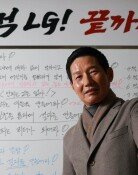Reasons for rush to correct macroeconomic goals
Reasons for rush to correct macroeconomic goals
Posted April. 09, 2001 13:03,
With cloudy skies on the nation`s economic horizon, the government is hurriedly preparing an umbrella.
The decision to work out comprehensive countermeasures, including correction of major economic goals, in the Apr. 7 meeting of economic ministers at Cheong Wa Dae is considered to be the first step. President Kim Dae-Jung emphasized that the external economic environment has changed, saying that the global economic situation is not that favorable to Korea and that the nation is somewhat relaxed after overcoming the foreign exchange crisis.
There is a shadow on the overall global economy with the slowdowns in the U.S. and Japan and the weakening value of the yen. The global economic growth rate is projected to slow to 3 percent from the previous projection of 4 percent and the global commodity trade will also increase by 6 percent compared with the original expectation of 7-8 percent. In the domestic economy, the business survey index (BSI) has improved slightly but the nation is facing a potential setback in exports and rising inflation and unemployment rates. In the financial sector, stock prices and the exchange rate have fallen substantially. It won`t be easy to achieve the government targets of a 5-6 percent economic growth rate and 3 percent inflation and unemployment.
Unless the U.S. and Japanese economies recover soon, these economic goals need to be corrected. Economists say the nation`s economic growth rate may slow to 4 percent. And it is believed that keeping the consumer price hike at the 3 percent level is practically impossible. It could rise to around 5 percent, considering the weakening won and projected hikes in public utilities charges during the second half. It is essential to curb the won`s depreciation to control inflation, but it is impossible to just fix the exchange rate because of sluggish exports. The question of unemployment is the same. The number of jobless people exceeded 1 million last February and the unemployment rate soared to the 5 percent level. The overall economic situation is expected to further deteriorate, but this year`s jobless rate is likely to be around the 4.5 percent level.
However, the government is expected to monitor whether restructuring is progressing as scheduled during the first half, without taking any additional economy-boosting measures. It plans to complete establishment of a real estate restructuring company and nurture the junk bond market. It also intends to attract investors by offering tax incentives to long-term stock investors and encouraging pension funds to expand stock purchases. Still, the government may consider taking economy-boosting measures if the recessions in Japan and the United States are prolonged, thus having a negative influence on the Korean economy. If growth potential is excessively weakened, the government might have to take a series of steps, including offering financial support by setting aside a supplementary budget.
In addition to receiving President Kim`s directive, participating economic ministers held discussions on each sector. Prime Minister Lee Han-Dong raised the question of why China isn`t that seriously hurt by the recessions in Japan and the United States. On this question, Finance-Economy Minister Jin said that the structure of China`s export industries is different from that of Korea.
Kwon Soon-Hwal shkwon@donga.com






![[단독]현직 검사, ‘검찰청 폐지’ 첫 헌법소원…“수사권 박탈 위헌”](https://dimg.donga.com/c/138/175/90/1/wps/NEWS/IMAGE/2025/12/30/133061316.1.jpg)
